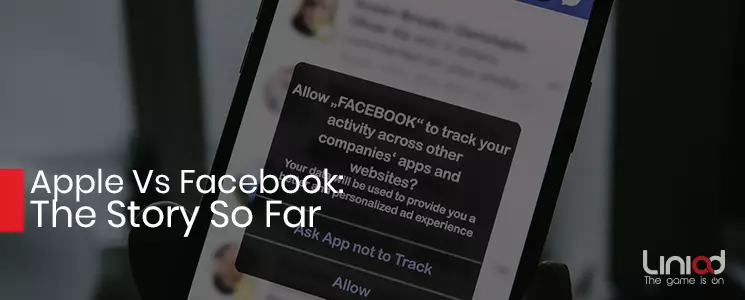Apple Vs Facebook: The Story So Far

2020 was a crazy ride. If COVID and its impact on the mobile marketing ecosystem wasn’t enough to ‘entertain’, then simply glance towards the mud slinging that went down between Apple and Facebook. The social media monster took out a series of print ads taking a first punch which Apple quickly hit back at.
This digital brawl revolves around privacy and iOS14, but let’s face it, when looking closely at business models, its clear to see that friction was bound to surface at some point – Apple sells tier-one priced hardware and controls the entire app journey (with a privacy-emphasis), and Facebook offers free (ad supported) social communication tools to billions of users globally.
Centered firmly on Apple’s launch of App Tracking Transparency feature of Apple’s iOS14 – Facebook flagged concern as this move puts the stoppers on publishers freely grabbing data on users without thorough consent, which in turn hinders ads precision-targeting. Users now have the ability to opt in or out of data tracking, effectively blocking targeted data gathering- or so it seems.
How Real Is The Struggle?
Facebook continues to scream and shout that data accumulated by trackers is critical for companies that rely on running ads to drive sales and grow audiences. If users opt out of tracking, Facebook will no longer be able to report user data to advertisers which includes click through and sales. But let’s not forget that this latest move from Apple is an evolution of code that actually already existed in previous iOS – the LAT ( Limit Ad Tracking) option- which has only managed to activate a mere 20% of users,
Apple’s upgraded privacy attempt could very well impact Facebook and beyond (Snapchat are the latest to forecast possible damage), but the world of mobile app marketing will be forced to adapt. Case in point: GDPR – when concerns hit, (and there were many), the ecosystem was quick to adapt and it now seems very much a thing of the past.
It’s fair that Facebook remains concerned, particularly as the latest iOS adoption is a seamless experience- one simple toggle and trackers are given the red card, yet Apple repeatedly reassured that it aims for better transparency rather than to force companies like Facebook to aggressively change their business model. Indeed, all app developers will need to assess this change, and ad systems and partnerships will still continue strongly via Apple’s new App Transparency kit which aims to guide users on where and how their data is being used.
A Word on API and Audience Network
Place panic to one side and let’s talk paid ads – so far there is no indication that there will be any massive impact, although with this ongoing ‘war’ it could well be important to review the Facebook conversions API- which allows servers to trigger web events directly through to Facebook (think browser based Pixel). If this approach is the way forward then get it done – see this guide from Adjust to get started.
So Where Exactly Are We Now?
To be honest, we’re not much further down the line. After making a whole load of noise, it appears that Facebook has finally faced the cold reality that Apple will not be giving in on this any time soon – no matter the volume at which it shouts. The social giant is now telling business partners that it has no choice but to comply with Apple’s requirements which, according to Facebook, will surely have an impact on businesses. Facebook, although slowly complying to Apple‘s requirements, continue to hold the argument that this measure will reduce the effect of ads and is anti-business, yet they are still sending out comms encouraging partners to update and comply rather than face a block further down the road – which would further complicate the issue. Facebook maintains that these privacy changes are not pro-user, rather they are pro-Apple. They continue to push out the rhetoric that Apple aims to reroute user revenue from ads to subscriptions and in-app purchases in turn giving Apple a nice percentage of fees.
And while this rumbles on, Apple is making it crystal clear that it is not anti-ad, but rather is aiming to give users relative transparency and ultimately, the choice of whether to permit tracking up front rather than be tracked implicitly.
Regardless of the back and forth between Facebook and Apple, what’s evident is that the landscape is shifting. The impact of these privacy changes might not be enough to warrant panic, but change is definitely in the air – app marketers will need to adapt quickly to maintain any kind of ‘business as usual’.
As iOS 14.3 saw a recent release with very little noise, we are still in the dark when it comes to seeing exactly how these changes will evolve within data- particularly now that this update is up and running. At this stage it seems there is no need for panic. It appears that opting out of tracking will not stop ads from being seen, yet rather fewer relevant ads will be displayed- with advertisers no longer being able to target based on activity and interest. Impact on advertising and results remain unclear and just how many users turn off tracking remains to be seen. Watch this space for further updates.

